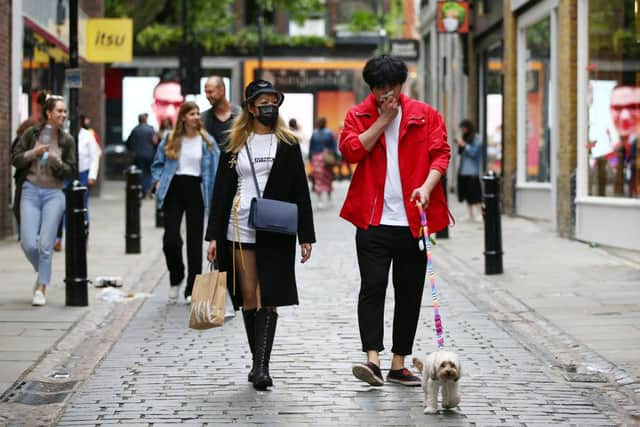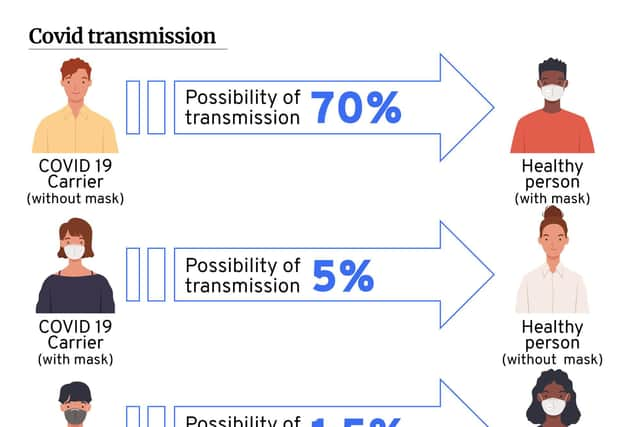Does wearing a face mask protect me? Why use of face coverings may continue after Covid restrictions lifted
This article contains affiliate links. We may earn a small commission on items purchased through this article, but that does not affect our editorial judgement.
and live on Freeview channel 276
The Prime Minister has set out his plans to lift all remaining coronavirus restrictions in England on 19 July for the final step of the lockdown roadmap.
Boris Johnson has stressed that a final decision on the reopening of society will not be taken next week, but it is expected that it will go ahead on the July date as planned.
Advertisement
Hide AdAdvertisement
Hide AdWe want to hear from you: let us know what you think about this story and be part of the debate in our comments section below


This final step will see the one metre plus social distancing rule scrapped, nightclubs will reopen for the first time since lockdown began, festivals will return and, perhaps most contentious of all, it will no longer be a legal requirement to wear a face mask from 19 July onwards.
People will instead be encouraged to “exercise their personal responsibility” when it comes to mask wearing, with Mr Johnson adding there will be guidance to suggest people “might choose” to wear face coverings when cases are rising, or in enclosed spaces.
Officials suggested people who are particularly vulnerable to Covid-19 could travel on public transport at less busy times to reduce the risk to themselves.
Advertisement
Hide AdAdvertisement
Hide AdThe plan to abandon mandatory face coverings has been met with heavy criticism, with many people saying they will continue to use masks regardless of the rule change.


How much protection do face masks provide?
Covid-19 is primarily transmitted through the air in respiratory droplets that are exhaled when a person coughs, sneezes, sings, talks or breathes, and these infected droplets are then inhaled by someone else.
Several laboratory tests and scientific studies suggest that wearing face masks can block up to 80 per cent of these droplets from being released into the air, and may prevent around 50 per cent from being inhaled. Although the evidence on the benefits of mask wearing is far from conclusive.
Andrew Lee, reader in global public health, University of Sheffield, told NationalWorld that the risk of Covid-19 infection can be cut by around 25 per cent by wearing a face mask, and suggested it would be beneficial to continue using coverings in some situations going forward.
Advertisement
Hide AdAdvertisement
Hide AdMr Lee explained: “I would have preferred that some measures be kept in place, such as social distancing and face masks.
“Face masks are a good thing from a safety point of view. It is the decent thing to mask up if you are feeling unwell.
“This is an airborne virus, so the best way to protect against it is to cover your face. I think that we almost forget that the virus spreads in the air, so wearing a mask is an added layer of protection.”
Dr Laurence Aitchison, lecturer in machine learning and computational neuroscience, at the University of Bristol, argued that wearing masks can have a strong impact on lowering transmission, and agreed it is a simple thing everyone can do to help manage the risks.
Advertisement
Hide AdAdvertisement
Hide AdHe said: “Our research has shown mask-wearing reduces the spread of Covid-19 by around 25 per cent if everyone wears them.
“At a time when mask-wearing is decreasing and mask mandates are being lifted, the findings confirm that masks do indeed have a strong impact on lowering transmission of the virus and remain an important measure in our response against it.”
Mixed reaction to face masks rule change
Health Secretary Sajid Javid and Boris Johnson have both said they will continue to wear face masks in crowded and enclosed spaces for the foreseeable future, while England’s chief medical officer Professor Chris Whitty and the government’s chief scientific adviser Sir Patrick Vallance also pledged to wear face masks in certain situations.
A YouGov survey of 2,749 British adults has indicated that 71 per cent of the public want current rules to remain in place for longer, while many organisations are expected to keep guidance on wearing face masks in place beyond 19 July.
Advertisement
Hide AdAdvertisement
Hide AdMayor of London Sadiq Khan said discussions are planned between Transport for London, the Department for Transport and other transport providers “before we decide our next steps”.
Trade union Unite, which represents tens of thousands of public transport workers, claimed it would be “an act of gross negligence by the government” to end the requirement to wear face coverings on public transport in two weeks.
Despite many saying they will continue to wear face masks even if they are no longer mandatory, the change in advice has been welcomed by others, and not everyone will choose to continue wearing masks once rules change.
Prof Robert Dingwall, professor of sociology at Nottingham Trent University, said that the benefits of wearing face masks “have always been uncertain because the quality of the evidence in both directions is so weak”, and suggested that the decision to make coverings voluntary is a positive step.
Advertisement
Hide AdAdvertisement
Hide AdProf Dingwall explained: “Any benefit has probably been quite small – or it would have been obvious even from weak studies – and needs to be offset by the psychological impact on population fear and anxiety , on children’s learning and interactions with adults, on people with communication issues, and on the substantial number of adults who cannot wear masks because of underlying health conditions or other disorders, including previous trauma from assaults or abuse.
“In my opinion it is a positive step to make mask wearing voluntary. No government can know all the circumstances of individual immunity and context.
“It is much better to focus on advice, guidance and education so that people can adapt their behaviour to the actual risks that they are encountering rather than having a one-size-fits-all approach.
“However, it is important that the messages also give equal attention to those contexts that are essentially safe, like almost anywhere outdoors or well-ventilated indoor spaces like supermarkets.
Advertisement
Hide AdAdvertisement
Hide Ad“The government’s behavioural scientists must now work to defuse the fears they have amplified for the last 15 months.”
A message from the editor:
Thank you for reading. NationalWorld is a new national news brand, produced by a team of journalists, editors, video producers and designers who live and work across the UK. Find out more about who’s who in the team, and our editorial values. We want to start a community among our readers, so please follow us on Facebook, Twitter and Instagram, and keep the conversation going.
Comment Guidelines
National World encourages reader discussion on our stories. User feedback, insights and back-and-forth exchanges add a rich layer of context to reporting. Please review our Community Guidelines before commenting.